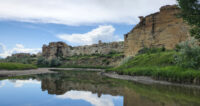Aquaponics a step toward sustainability, SACPA told
By Dale Woodard on October 23, 2021.
Sustainable agriculture, food security and aquaponics were on the menu at the Southern Alberta Council on Public Affairs online session Thursday.
On hand as the guest speaker was Michael Lavorato, who began working in aquaponics over the last five years to promote and enhance sustainable food systems.Â
Since then, Lavorato has built over 40 aquaponics systems across Alberta in schools, libraries and continuing care facilities.Â
In his half-hour presentation, Lavorato spoke of growing aquaponics in southern Alberta and educating students on the growth method combining agriculture and hydroponics.
“Aquaponics is a growing method which uses a combination of fish bacteria and plants for a continued growing cycle,” said Lavorato. “This growing method continues to be relevant as things continue to get worse around the region,” said Lavorato. “CBC had an eye opener (story) on the Old Man River this week and the decline continues to accelerate faster than most of the worst predictions were. We continue to see glyphosate in the water, pesticides and herbicides, every indicator is bad.
“So my project continues to become more relevant. World populations continue to rise. We have about eight billion people now and we’re not sure what that’s going to look like. Food security continues to be a problem globally. It looks like we’re on the worse-case scenario track.”
Climate change, said Lavorato, is also on a worst-case scenario pattern.Â
“We continue to see no good signs there as well. So here is a technology I found about seven years ago. I thought it would be something that could help this region.”
An aquaponics system contains fish in tanks, whose wastewater is pumped to vegetables in grow beds filled with gravel.Â
The vegetable extracts the nutrients out of the water and turns the water fresh to the fish, making a closed-loop ecosystem.
“So you get the fish, the proteins and the vegetables together in a closed, looped ecosystem. You don’t waste anything. It’s scale-able, you can do it small or you can do it big,” said Lavorato. “It has science that backs it up, there’s an aquaponics research centre in Lethbridge where I learned most of the ins and outs of this trade. Then my wife and I and some partners created Aquaponics World.”
Aquaponics World recently received a grant through the federal government and is now working with the Lethbridge Sustainable Living Association, said Lavorato.
They’re now also teaching students about the growth method.
“We come in and we build the system with students and staff if they want,” he said. “The design is not that elaborate. You need a fish tank for fish and then you need a separate grow bed for plants.
“There are endless designs, but it’s all the same principles.”
Lavorato said he also comes in and teaches the biology and the chemistry aspects of aquaponics.
“The nitrogen cycle is something all students can grasp. The system is all graspable, biological concepts. Our society comes in and teaches students about fish health and the date they can keep on their fish. Some systems keep the fish for food and most keep them for pets. This is just something that just adds to the community aspect of the school as well.
“We teach students how to germinate in these systems as well, how to grow plants in this method and it’s all something that after a year of help with these systems that the schools usually take over and they can take care (of it) themselves going forward.”
There are certain plants that grow well in aquaponics and there are certain plants that still prefer soil-based substrate, said Lavorato.
“So not everything works in aquaponics. Aquaponics does very well with things like basil and leafy greens, but it also will grow things like tomatoes and peppers.”
Still, Lavorato said the science checks out for aquaponics.
“For me, I found this niche of enjoying teaching students how to do it, but also hoping the technology gets exposure and we can actually start changing things in this region before it’s too late, if it’s not too late already.”
Lavorato said there are also social values of aquaponics he never predicted.
“I liked science and the ability of aquaponics. But the social value is something that is mindfulness, the meditational value around the systems and the fish. Just having a live animal in schools, a lot of students use the system to self-regulate. They’re allowed to go out and sit around the system for 15 or 20 minutes, come back into the class and then go back out when they need to centre. That’s something I didn’t predict, but something I really like seeing in the schools. They’re something we’ve put in common rooms or libraries, they become kind of a community thing.”
Lavorato has taken students on field trips to aquaponics farms as well as the Lethbridge Aquaponics Centre.Â
“Just seeing the small Microsystems might not be enough for the students, seeing an actual working farm, they can start to put it together if this is something possible.
“Hopefully this small step we make as a society and my small aquaponics gig can make a difference in this area.”
While the method continues to make strides, Lavorato said he warns people aquaponics is not a “silver bullet.”
“I’ve been studying sustainable living for 20 years now throughout university and college. There are a lot more people who see the environmental issues around and believe there’s going to be silver bullet technologies. I think it’s going to have to be a combination of a lot of things and a lot of societal shifts, not just technology.”
Follow @dwoodardherald on Twitter
31-30




